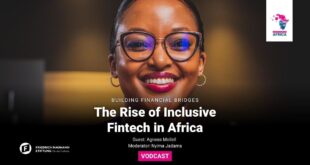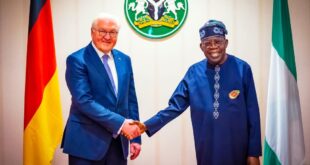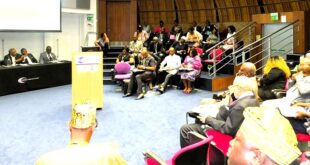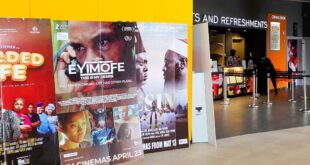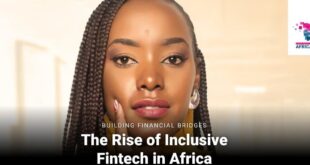Amid the gloom of recession and a tightening of belts in the homeland, Nigerian academics, business people and other professionals met with German companies to discuss ways of forging ahead in Hamburg, reports Michael Nnaji.
Nigerians living in Germany gathered in the port city of Hamburg recently to parley on what the great Nigerian writer Chinua Achebe once described as the country’s “favourite pastime”, namely “The Trouble with Nigeria”.
The occasion was the 56th independence anniversary celebrations on 1 October and it was organized by Nigerians in Diaspora (NIDO) Germany Chapter, an umbrella organization of Nigerian professionals and business people living and working in Germany.
The event, co-sponsored by FARMAPLANT and MoneyGram, featured a series of lectures on the nation’s various challenges, and more importantly, throwing a searchlight on pragmatic ways forward.

It was a 2-day event stretching from 30 September and culminating on 1 October with an award ceremony recognizing the efforts of Nigerians in Germany and Europe – including this magazine’s publisher, Femi Awoniyi – who have contributed in improving the image of the country and its citizens.
The event was graced by the acting Head of Mission at the Nigerian Embassy in Berlin, Mr Kenneth Okey, who delivered a keynote address on the opening day, as well as Ambassador John C. Ejinaka, Consul General of Nigeria, Frankfurt, who talked on attracting foreign investment to the country.
Recently, the Nigerian government declared that the country was in recession, primarily caused by the fall in crude oil prices on the world market. For starters, revenues accruing from crude oil sales represent more than 90% of the country’s forex income. The major tenor of discussions therefore centred on ways to diversify the economy.
More specifically, lectures that caught the attention were those that revolved around providing local alternatives, to wit: making bread from cassava, housing projects utilizing mud rather than cement with the added advantage of obviating the need for air-conditioning etc.

It is effectively a clarion call to not only go back to the roots, roll back decades of environmental neglect and, interestingly in line with the occasion of “independence celebrations”, unlearn baleful aspects of colonial legacy.
The event was also significant for the fact that it was the last public event of the executive committee of NIDO, bringing a 3-year tenure to a close. Its president, Mr Kenneth Gbandi, recounted in an emotional speech the myriad challenges his committee encountered during the period while also thanking members of his executive committee for their sacrifices and efforts in keeping the NIDO flag flying.
The Nigerian embassy represented on Day 2 of the festivities by Minister Jibril Adamu, on its part, thanked NIDO for its leadership role and commitment to the Nigerian cause. He expressed the embassy’s gratitude towards NIDO for taking up the mantle of leadership.
NIDO, on its part, hoped that some of the inventive and creative solutions to the economic crisis proffered and demonstrated at the event will be passed on to the Federal Government and see the light of the day, rather than left to gather dust on the shelf.
“With economic crises comes opportunity,” noted Mr Gbandi, in his pre-conference notes. He remarked that, as a body recognized by the Federal Government of Nigeria, the NIDO business forum was an effort geared towards assisting in “attracting foreign direct capital to Nigeria” while reducing her overdependence on crude oil as the main foreign exchange earner.
In many ways, this event was a follow-up of the German-Nigerian Economic Forum in July this year in Potsdam (Germany) organized by the Nigerian Embassy and the Brandenburg Chapter of the German Chambers of Commerce and Industry, which witnessed a rubbing of minds between German business people and Nigerian government officials.
That conference sought to tap into German expertise especially in the areas of science and technology with a view to boosting the Nigerian economy and help unlock certain areas of economic activities in a country renowned for the resourcefulness of its people.
 THE AFRICAN COURIER. Reporting Africa and its Diaspora! The African Courier is an international magazine published in Germany to report on Africa and the Diaspora African experience. The first issue of the bimonthly magazine appeared on the newsstands on 15 February 1998. The African Courier is a communication forum for European-African political, economic and cultural exchanges, and a voice for Africa in Europe.
THE AFRICAN COURIER. Reporting Africa and its Diaspora! The African Courier is an international magazine published in Germany to report on Africa and the Diaspora African experience. The first issue of the bimonthly magazine appeared on the newsstands on 15 February 1998. The African Courier is a communication forum for European-African political, economic and cultural exchanges, and a voice for Africa in Europe.



